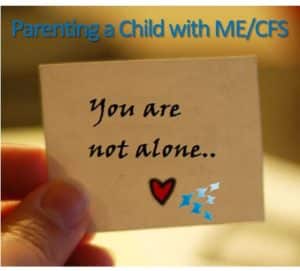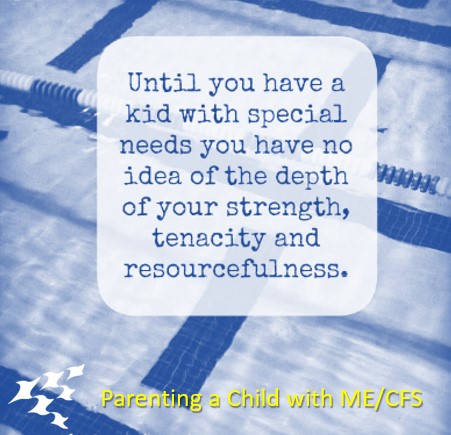Parenting is one of life’s greatest challenges, made all the more complex if your child has a chronic illness like ME/CFS. We want you to know that you have options for building a strong network of support to help cope with the challenges of special needs parenting.
Written by a mom who walks this road with you, we hope the following information is helpful.
__________
Parenting a Child with ME/CFS
By Heather Jarman
Warrior Mom and Fearless Advocate

“Welcome to a club you never wanted to join. Members of this club are the parents of chronically ill children with ME/CFS. While no one chooses to be part of this group, circumstances have placed you here and now that you are in our ranks, you should know that you are among friends. You have joined an extended family of people around the world who are bound by the common quest to defeat ME/CFS and see their child—or children—healed from this nightmare disease. A few tips, gleaned from parents of ME/CFS patients, may help you as you move forward.”
– Heather Jarman, Warrior Mom
You are not alone. Create an affirming support system.
Among your first thoughts will likely be, “How do I help my child cope with this diagnosis?”  But the reality is that your child’s ability to successfully navigate this disease will most likely hinge on you. To be your child’s primary advocate and medical coordinator, you need to establish a reliable support system. Most caregivers in this situation discover that few people in their extended circle of friends and family know enough or have skill sets that offer meaningful support early on in the diagnostic process. Serious, but more common childhood diseases like cancer usually have a variety of community resources to choose from—not so in ME/CFS. Don’t be discouraged: help is available! A great place to start is to join the Facebook group, Parents of Kids & Teens with ME/CFS and Related Illnesses, moderated by ME/CFS patient and mother of two sons with ME/CFS, Sue Jackson. Membership in this private, closed group is confirmed by a FB message so make sure you check the “other” folder in your Facebook message tab.
But the reality is that your child’s ability to successfully navigate this disease will most likely hinge on you. To be your child’s primary advocate and medical coordinator, you need to establish a reliable support system. Most caregivers in this situation discover that few people in their extended circle of friends and family know enough or have skill sets that offer meaningful support early on in the diagnostic process. Serious, but more common childhood diseases like cancer usually have a variety of community resources to choose from—not so in ME/CFS. Don’t be discouraged: help is available! A great place to start is to join the Facebook group, Parents of Kids & Teens with ME/CFS and Related Illnesses, moderated by ME/CFS patient and mother of two sons with ME/CFS, Sue Jackson. Membership in this private, closed group is confirmed by a FB message so make sure you check the “other” folder in your Facebook message tab.
Find the page HERE
This international Facebook group is a safe, thoughtful place to seek advice, emotional support and get input about everything from doctors and treatments to questions about supplements, travel concerns and how to cope with holidays. The parents in this group are up on the latest research and many have worked with ME/CFS specialists around the world. They offer a space to vent or grieve and offer feedback. Sometimes, as a caregiver, you simply need a friend.
There are also Facebook groups and forums that specialize in providing information and support to families facing diagnoses that are often co-morbid with ME/CFS such as orthostatic intolerance and POTS. Some of these are regional or country specific and can help you find information that is more specific to your child’s needs, or point you toward resources in your community.
The internet is a double-edged sword when it comes to ME/CFS. As you start asking Dr. Google questions, you will quickly find there are quite a few blogs and forums written by or for people impacted by ME/CFS. Among some ME/CFS patients and advocates, you may find some negativity, polarization, and bitterness. Much of this is due to historical neglect and mistreatment by government health organizations and the general medical community. Consequently, be careful about how much time you spend in the online world before the parameters of your new life as a caregiver are better defined. Being overwhelmed by many conflicting opinions is common. Until you find your footing, utilize support groups to help you identify what resources may be most useful. As you grow in confidence and experience, you will develop your own template for what information has value and what to avoid.
Know that this disease is real and learn everything you can about it.
One of the most challenging aspects of an ME/CFS diagnosis is that the disease is poorly understood by both the medical community and the general public. Many individuals—some who should know better—will make insensitive, hurtful comments about your child’s diagnosis. The reality is the National Academy of Science’s Institute of Medicine (IOM), one of the most respected bodies in the scientific community in the US, has stated, “ME/CFS is a serious, chronic, complex, systemic disease that often can profoundly affect the lives of patients.” The report goes on to explain the very real, very difficult symptoms of autonomic dysfunction, neurocognitive impairment, sleep disruption and crushing fatigue.
Download a copy of the IOM’s ME/CFS clinician’s guide and distribute it to your medical team members. Provide copies to friends, family and professionals who have questions.
Access is HERE
Though there is little scientific consensus about this illness, you will find a myriad of opinions about what it is, what causes it and what treatments should be utilized. Consequently, one of your key responsibilities as your child’s caregiver is to educate yourself. At times, this feels overwhelming, particularly if science isn’t your favorite subject. The truth is that the more you understand, the better you can help your child. By default, ME/CFS parents often become well-versed in anatomy and physiology, pharmacology, and molecular biology, as well as most of the theories of the “how, why and what” of this disease. Some ME/CFS patients have co-morbid conditions that should be ruled out or considered when formulating a treatment protocol i.e. dysautonomia, POTS, Ehler-Danlos Syndrome, mast-cell activation, genetic disorders, and physiological abnormalities like a Chiari malformation. Being aware of these issues can help refine your child’s diagnosis. Knowledge is power: empower yourself, and thus your child.
Seek reliable medical advice and treatment options.
If you can secure an appointment with an ME/CFS specialist, do it. These specialists have waitlists. Don’t despair. During your wait time, seek out specialists or ME/CFS friendly primary care/general practice doctors who can help facilitate testing and diagnostics. Many ME/CFS patients see rheumatologists, neurologists, immunologists, gastroenterologists, and cardiologists as well as alternative medicine practitioners. While ME/CFS experts are few and far-between, education and outreach is continually improving. Some ME/CFS specialists will consult with your child’s pediatrician or specialists to provide support for your child’s treatment plan. Finding good practitioners in all specialties is often done by word of mouth between patients and caregivers, especially online. This is a key reason to have a reliable ME/CFS support system in place.
Think of yourself as the general contractor of your child’s medical team. You will be overseeing every aspect of your child’s healthcare and facilitating connections and dialogue between your practitioners. Keep a record of everything related to this process, including copies of all treatments, reports, imaging studies and labs. Your child’s best hope for both accurate/effective treatment and getting treatment authorized may come down to having adequate data to justify your clinician’s diagnostic conclusions. Sometimes, it is hard to know whether a treatment is working or not because so many ME/CFS treatments need to be utilized over longer periods of time. Keeping a journal of symptoms, treatments and other factors can sometimes help illuminate the effectiveness of a treatment, or the correlation between triggers and symptoms.
If there is one warning pertaining to treatments, it would be to proceed thoughtfully. Having a child with a serious, chronic illness is overwhelming and terrifying, particularly when it seems like little improves. Going to extremes to find help is a natural tendency. There are unscrupulous practitioners who will promise “magical” results, usually in exchange for large sums of money. Research and confirm that whatever a practitioner is offering is supported by independently verifiable results—not just website testimonials. The old adage, “if it sounds too good to be true it probably is” applies here. There are no easy answers or instant fixes for this illness.
The state of ME/CFS research is growing and changing almost monthly. Have hope!
Find out what is required for your child to receive educational accommodations in your community
An obstacle faced by every caregiver to a child with ME/CFS is how to manage the child’s education. Whether the child is in elementary school or in college, institutional regulations have to be followed. The sooner you sort out this aspect of your child’s life, the sooner you can shift your more of your focus to your child’s day to day well-being. Laws, regulations and procedures vary from place to place. Once you have a doctor’s note and/or documentation supporting your child’s diagnosis, most educational institutions have an administrative process that disabled students work through to secure the legal rights and protections they are entitled to have. Sometimes, securing school’s cooperation requires additional support; some parents hire disabled rights advocates or lawyers whose expertise in these areas to help navigate the system.
Access two blogposts from a parent of two sons with ME/CFS where she explains the processes she went through to sort out her children’s educational needs, HERE and HERE.
Self-care is essential.
Caregiver burn-out is real and maybe one of the most common and least dealt with aspects of being the parent of a chronically ill child. It is intuitive to want to give your child your all—to secure them every resource, uncover every option, fight every battle that may help them get well. It becomes all too easy to neglect your life beyond your child.
You cannot be a warrior for your child if you have neglected yourself to the point of weakness. Attend to your well-being by making time for socializing, hobbies, exercise, and activities unrelated to your child or ME/CFS. If all you can manage is to read a book or a magazine, call a friend, or go for a brief walk, do it. Letting self-care slide is easy, especially when your child’s health is unpredictable. Don’t forget your health, including an annual physical and regular dentist visits. Find providers that better accommodate your needs, such as those that offer weekend or evening appointments. Take advantage of delivery services, drive-through pick-up, and mail order businesses that can help you streamline day to day responsibilities. Maintain your inner-life, giving yourself time for contemplation, spirituality or meditation. Seek out a counselor, religious leader, or therapist for pastoral care if such support helps you cope with the stressors of your life. Enlist friends or family to help with caregiving responsibilities so that you can have time away.
Give yourself permission to grieve, to be angry. There is nothing about this diagnosis or this process that is fair. At the same time, moving beyond negativity is vital if you want to go the distance. It may not seem like anything will ever be the same again—odds are it won’t be—but you can and will go on. You will find the new normal.
Never forget: You are not alone.
_________
Download and print a copy of this information: BHC_ParentsGuide

 Lucinda Bateman, MD, is a renowned clinician, researcher, and educator. Her Johns Hopkins University Medical School training instilled an approach to care that she has employed throughout her career - the patient comes first and the unknown or unexplained does not equate to a lack of proper and compassionate care. Since starting her own practice in 2000, she has served on six boards or committees, been the principal investigator for 45 studies, authored/coauthored 40 journal articles, served as adjunct instructor and adjunct assistant professor in the University of Utah Departments of Preventative Medicine, Internal Medicine, and Anesthesiology, and lectured around the world.
Lucinda Bateman, MD, is a renowned clinician, researcher, and educator. Her Johns Hopkins University Medical School training instilled an approach to care that she has employed throughout her career - the patient comes first and the unknown or unexplained does not equate to a lack of proper and compassionate care. Since starting her own practice in 2000, she has served on six boards or committees, been the principal investigator for 45 studies, authored/coauthored 40 journal articles, served as adjunct instructor and adjunct assistant professor in the University of Utah Departments of Preventative Medicine, Internal Medicine, and Anesthesiology, and lectured around the world.